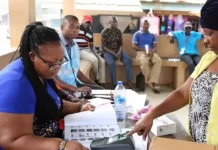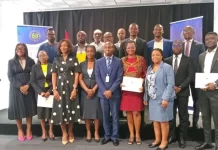
Financial inclusion is on the rise globally, accelerated by mobile phones and the internet, but gains have been uneven across countries. Globally, 1.7 billion adults remain unbanked, yet two-thirds of them own a mobile phone that could help them access financial services.
A new World Bank report, issued during the 2018 Spring Meetings of the International Monetary Fund (IMF) and the World Bank on the use of financial services, said digital technology could take advantage of existing cash transactions to bring people into the financial system, the report finds.
For example, paying government wages, pensions, and social benefits directly into accounts could bring formal financial services to up to 100 million more adults globally, including 95 million in developing economies.
Globally, 69 percent of adults – 3.8 billion people – now have an account at a bank or mobile money provider, a crucial step in escaping poverty. This is up from 62 percent in 2014 and just 51 percent in 2011.
From 2014 to 2017, 515 million adults obtained an account, and 1.2 billion have done so since 2011, according to the Global Findex database, adding that, men remain more likely than women to have an account.
While in some economies account ownership has surged, progress has been slower elsewhere, often held back by large disparities between men and women and between the rich and poor. The gap between men and women in developing economies remains unchanged since 2011, at 9 percentage points.
There are other opportunities to increase account ownership and use through digital payments: more than 200 million unbanked adults who work in the private sector are paid in cash only, as are more than 200 million who receive agricultural payments.
“We already know a lot about how to make sure women have equal access to financial services that can change their lives,” Melinda Gates, Co-Chair of the Bill & Melinda Gates Foundation, said.
“When the government deposits social welfare payments or other subsidies directly into women’s digital bank accounts, the impact is amazing. Women gain decision-making power in their homes, and with more financial tools at their disposal they invest in their families’ prosperity and help drive broad economic growth.”
The Global Findex, a wide-ranging data set on how people in 144 economies use financial services, was produced by the World Bank with funding from the Bill & Melinda Gates Foundation and in collaboration with Gallup, Inc.
“In the past few years, we have seen great strides around the world in connecting people to formal financial services,” World Bank Group President Jim Yong Kim said.
He added: “Financial inclusion allows people to save for family needs, borrow to support a business, or build a cushion against an emergency. Having access to financial services is a critical step towards reducing both poverty and inequality, and new data on mobile phone ownership and internet access show unprecedented opportunities to use technology to achieve universal financial inclusion.”
There has been a significant increase in the use of mobile phones and the internet to conduct financial transactions. Between 2014 and 2017, this has contributed to a rise in the share of account owners sending or receiving payments digitally from 67 percent to 76 percent globally, and in the developing world from 57 percent to 70 percent.
“The Global Findex shows great progress for financial access–and also great opportunities for policymakers and the private sector to increase usage and to expand inclusion among women, farmers and the poor,” H.M. Queen Máxima, the United Nations Secretary-General’s Special Advocate for Inclusive Finance for Development, has stated.
This edition of the Global Findex database includes updated indicators on access to and use of formal and informal financial services. It adds data on the use of financial technology, including mobile phones and the internet to conduct financial transactions, and is based on over 150,000 interviews around the world. The database has been published every three years since 2011.
The Global Findex database has become a mainstay of global efforts to promote financial inclusion. The data offer a wealth of information for development practitioners, policymakers and scholars, and are helping track progress toward the World Bank Group goal of Universal Financial Access by 2020 and the United Nations Sustainable Development Goals.
Felix Dela Klutse, Washington DC, USA
























